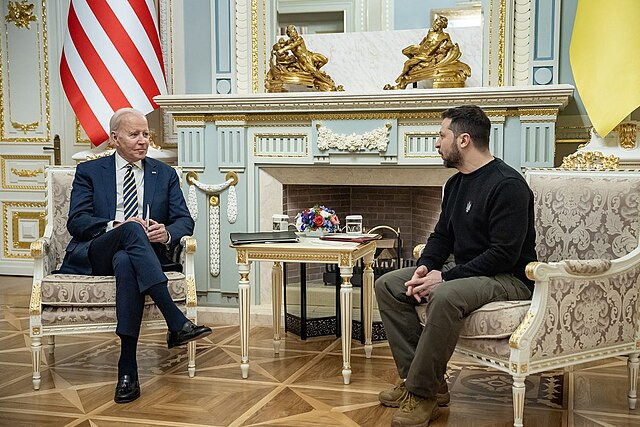Ukrainian President Volodymyr Zelensky, on a high-profile visit to the United States, expressed optimism that the war with Russia is nearing its conclusion, urging decisive action from Washington to hasten the end of the conflict. In an interview with ABC News, Zelensky asserted that Ukraine is "closer to the end of the war than many believe" and stressed the need for continued support from Ukraine's allies to achieve a just peace.
Speaking during the United Nations General Assembly in New York, Zelensky reiterated his call for strengthened cooperation between Ukraine and the United States. "Decisive action now could hasten the just end of Russian aggression against Ukraine next year," he stated on his Telegram account following a meeting with a bipartisan delegation of U.S. lawmakers. The Ukrainian president is also scheduled to meet with U.S. President Joe Biden to present a "victory plan" aimed at shaping White House policy on the war, regardless of the outcome of the upcoming U.S. presidential election in November.
Zelensky's remarks follow months of intense fighting between Ukrainian forces and Russian troops, which have left thousands dead and millions displaced. While Russian forces continue to control about 20% of Ukraine's territory, Zelensky's confidence in a potential resolution has grown as Ukrainian troops have made advances in key areas, including a recent offensive into Russia's western Kursk region. "We are closer to peace than we think," Zelensky said in the interview, adding that Ukraine's military operations have exposed vulnerabilities in Russian President Vladimir Putin's strategy.
The ongoing conflict, which began in February 2022, has turned Ukrainian cities into war zones and inflicted widespread devastation. Zelensky's visit to the U.S. is part of a broader diplomatic push to secure additional military and financial support from the West. During his meeting with U.S. lawmakers, he praised the "unwavering commitment" of both Democrats and Republicans to Ukraine's cause and emphasized Washington's critical role in defending freedom globally.
However, the political landscape in the U.S. presents new challenges for Zelensky's mission. Former President Donald Trump, now a Republican presidential candidate, has criticized U.S. financial aid to Ukraine and claimed, without evidence, that Zelensky is backing the Democrats in the upcoming election. At a rally in Pennsylvania, Trump remarked, "Every time [Zelensky] comes into the country, he walks away with 60 billion dollars," and suggested that Zelensky would prefer a Democratic victory in November. Trump has also vowed to broker a deal between Russia and Ukraine to end the war within days if elected president, though Zelensky has previously stated his willingness to work with whoever occupies the White House.
Amid these political dynamics, Zelensky's "victory plan" has garnered significant attention. Though details of the plan remain sparse, the Ukrainian leader has described it as a "bridge to a diplomatic way out" and part of a broader effort to secure peace. A key component of the plan is Ukraine's accelerated NATO membership, a prospect that Moscow has firmly rejected. Putin has made it clear that peace negotiations will only commence if Kyiv cedes control of significant portions of eastern and southern Ukraine and abandons its NATO aspirations-conditions that Zelensky has consistently refused.
Ukraine's chief of staff, Andriy Yermak, emphasized the importance of NATO membership in achieving long-term security for Ukraine. Speaking in New York, Yermak reiterated that Kyiv's ultimate goal is to fully restore Ukraine's territorial integrity, a position that has been unwavering since the war began.
While in New York, Zelensky also met with international leaders, including German Chancellor Olaf Scholz and Japanese Prime Minister Fumio Kishida. Discussions with these leaders centered on how to expedite the process toward a just peace and secure further aid for Ukraine. Zelensky's conversation with Kishida included talks about energy support, while his meeting with Indian Prime Minister Narendra Modi marked a deepening of relations between Kyiv and New Delhi.
Despite these diplomatic efforts, the war continues to exact a heavy toll on both sides. Ukrainian cities remain under constant threat from Russian missile strikes. On Monday, Russian forces launched another series of attacks on the southeastern city of Zaporizhzhia, killing one person and wounding several others, including a 13-year-old girl. In response, Ukraine continues to shell Russian border towns, with a recent attack killing three civilians, including a child, in the Belgorod region.
As Ukraine pushes for more sophisticated weapons from its Western allies, including long-range missiles that could strike deep into Russian territory, the issue of military escalation remains a point of contention. G7 foreign ministers met on the sidelines of the U.N. General Assembly to discuss the provision of long-range missiles to Ukraine, a move that could significantly alter the dynamics of the war. EU foreign policy chief Josep Borrell acknowledged that Russia has been bolstered by new weapons from Iran, despite Tehran's official denials.
Meanwhile, in Russia, the rights situation continues to deteriorate. A report from a U.N.-mandated commission revealed that torture has become a "common and acceptable practice" in prisons under Russian control, with doctors allegedly participating in the abuse of Ukrainian detainees. The commission's findings were presented in Geneva, where U.N. experts also raised concerns about the increasing violence within Russia as former prisoners, recruited to fight in Ukraine, return home with pardoned criminal records.
Zelensky's U.S. visit comes at a critical juncture for Ukraine's war effort. As the conflict grinds on, both Ukraine and Russia appear locked in a brutal stalemate. The outcome, as Czech President Petr Pavel told The New York Times, may leave parts of Ukraine under Russian occupation for years to come. "A defeat of either Ukraine or Russia will simply not happen," Pavel said, suggesting that the war's resolution will likely be a compromise between both sides.




